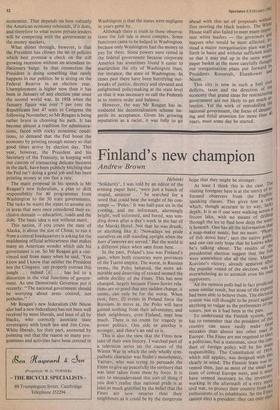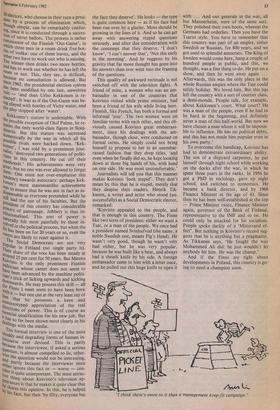Finland's new champion
Andrew Brown
Helsinki `Solidarity', I was told by an editor of the evening paper here, 'were just a bunch of stupid, amateur ... ' he searched for a word that could bear the weight of his con- tempt — 'Poles.' It was half-past six in the evening, and my informant, alarmingly bright, well informed, and bored, was win- ding down after a day's work in the bar of the Marski Hotel. Not that he was drunk, or anything like it: 'Nowadays we pride ourselves on still standing upright when the hors d'oeuvres are served.' But the world is a different place when seen from here.
In the past, Poland's loss was Finland's gain, when both countries were provinces of the Tsarist empire. The worse, in Russian terms, the Poles behaved, the more ad- mirable and deserving of reward seemed the subtle docility of the Finns. This has now changed, largely because Finno-Soviet rela- tions are so good that any sudden change, it seems, can only be for the worse. When (not, here, if) events in Poland force the Russians to move in, the Poles will have gained nothing from their adventures; and their neighbours, even Finland, may lose much. There is no room for tragedy in power politics. One side or another is stronger, and there's an end to it.
This is also the view that the Finns now take of their own history. I watched part of a television series on the causes of the Winter War in which the only wholly sym- pathetic character was Stalin's mouthpiece, Yartsev, who was trying to persuade the Finns to give up peacefully the territory that was later taken from them by force. It is easy to misunderstand this sort of thing if you don't realise that national pride is at least as much gratified by the belief that the Finns are now smarter than their neighbours as it could be by the dangerous
hope that they might be stronger.
At least I think this is the case. Ilhe visiting foreigner here is at the mercy oflry formed observers from the Engh.sti,,, speaking classes. This gives him a NIT" which, though accurate in its way, laer's depth. It is as if one were walking across a frozen lake, with no means of drilling through the ice to find how deep the water is beneath. One has all the information that a map-maker needs, but no more. ,plentY of fish down here', says the native guide' and one can only hope that he knows what he's he's talking about. The results of the presidential election suggest that the fish were somewhere else all the time. Matt,.11f. Koivisto's victory, already apparent art' the popular round of the election, was s° overwhelming as to astonish even his own supporters. All the opinion polls had in fact predicted some similar result, but none of the exPerr_is had been able to believe them. The electorait system was still thought to be proof age's anything so vulgar as the preferences of the voters, just as it had been in the past. To understand the Finnish system, on has to remember that the president of this country can more easily make fatal mistakes than almost any other man in Europe. The Finns are not required to elect a politician, but a statesman, since the CO duct of foreign policy will be his main responsibility. The Constitution of 191!, which still applies, was designed with this clearly in mind. The Finnish State was In vented then, just as most of the small na- tions of central Europe were, and it must have seemed necessary to the inventors, working in the aftermath of a very nacre civil war, to protect their country from.tn enthusiasms of its inhabitants. So the Finns cannot elect a president: they can only elect 30 electors, who choose in their turn a presi- dent by a process of elimination which, !hough simple, can be remarkably confus- ing, since it is conducted through a succes- sion of secret ballots. The process is rather reminiscent of the Finnish 'Out-Game', in Which three men in a room drink five bot- tles of vodka: one of them leaves, and the other two have to work out who is missing. The winner then drinks two more bottles, and has to work out whether he has left the because or not. This, they say, is difficult, u.ecause no consultation is allowed. But ,silice 1962, the presidential election system °as been modified by one last, unwritten tole — 'and then Urho Kekkonen is re- Fleeted'. It was as if the Out-Game was be- ing with bottles of Vichy water, and the Play stopped after 'water'. Kekkonen's stature is undeniable. With the Possible exception of Olof Palme, he re- mains the only world-class figure in Scan- A111avia. But this stature was increased domestically by the way in which all his Possible rivals were hacked down. 'Kek- °11en', I was told by a prominent Jour- 711st, 'destroyed two generations of politi- cians in this country. He cut off their 414hhoods.' His achievements were very tghreat, but no one was ever allowed to forget ,Ilent. One must not over-emphasise this ;_eridency tawards autocracy: perhaps Kek- ''°nen's most statesmanlike achievement .as to ensure that he was not in fact as in- cilsPensable as everyone pretended while he still had the use of his faculties. But the President of this country has considerable powers of patronage. Jobbery is thus in- stitutionalised. This sort of power is 4,turallY felt most painfully by those in- ,,,°'ved in the political process, but when the
Ix has been on for 20 years or so, even the voters are likely to react against it.
The Social Democrats are not very popular in Finland (no single party is). Their share of the vote has been steady at ajo.Und 25 per cent for 50 years. u Mauno koivisto is the only prominenB t t Finnish politician whose career does not seem .to have been advanced by the machine point- diall's trick of licking upwards and kicking tb°1vnwards. He may possess this skill — all
Finns I meet seem to have been born with it L, — but one can at the very least say of
,,41111 that he possesses a keen and u_11. stereotyped appreciation of the real edirections of power. This is of course an itssential qualification for his new job. But has so far been shown most clearly in his dealings with the media. The formal interview is one of the most te()(IdY and degrading forms of human in- reourse ever devised. This is partly because the interviewee, if asked a serious question, is almost compelled to lie, other- wise the question would not be interesting,
Partly because the interviewer must either ignore this fact or — worse — con- . stder it quite unimportant. The most attrac-
tive thing about Koivisto's television ap- larances is that he makes it quite clear that b shares this opinion. In this, he is helped Y his face, but then `by fifty, everyone has
the face they deserve'. He looks — the type is quite common here — as if his face had been run over by a glacier. Moss should be growing in the lines of it. And so he can get away with answering stupid questions seriously, and after due consideration with the contempt that they deserve. 'I don't know', 'I can't answer that', 'Not this early in the morning'. And he suggests by his gravity that far more thought has gone into his answers than ever went into the framing of the questions.
This quality of awkward rectitude is not switched off with the television lights. A friend of mine, a woman who was an am- bassador in one of the countries that Koivisto visited while prime minister, had been a friend of his wife while living here. Finnish, like French, has both a formal and informal 'you'. The two women were on familiar terms with each other, and this ob- viously caused Koivisto great embarrass- ment, since his dealings with the am- bassador, though close, were conducted on formal terms. He simply could not bring himself to propose to her in an unembar- rassed fashion that they drop titles, 'and even when he finally did so, he kept looking down at those big hands of his, with head on one side. He was most uncomfortable.'
Journalists will tell you that this manner makes Koivisto 'look stupid'. They don't mean by this that he is stupid, merely that they despise their readers. Henrik Tik- kanen, a writer and artist who stood (un- successfully) as a Social Democratic elector, remarked: `Koivisto appealed to the people, and that is enough in this country. The Finns like two sorts of president: either we want a Tsar, or a man of the people. We once had a president named Svinhufvud (the name, a noble Swedish one, means Pig's Head). He wasn't very good, though he wasn't very bad either, but he was very popular, because he was built like a bear, and always had a sheath knife by his side. A foreign ambassador came to him with a letter once, and he pulled out this huge knife to open it with And our generals in the war, all but Mannerheim, were of the same sort. They polished their own boots, whereas the Germans had orderlies. Then you have the Tsarist style. You have to remember that this country was part of an empire, either Swedish or Russian, for 800 years, and we got used to splendid autocrats. The King of Sweden would come here, hang a couple of hundred people in public, and this, we thought, was a fine thing to do. He put on a show, and then he went away again ... Afterwards, this was the only place in the whole Russian empire where the Tsar could safely holiday. We loved him. But this has left the country with a sort of courtier class, a demi-monde. People talk, for example, about Kekkonen's court. What court? He was a man of the people, even if he had to be hard in the beginning, and definitely never a man of this half-world. But now we have chosen a man whom it will be impossi- ble to influence. He has no political debts, and this has not made him popular even in his own party.'
To overcome this handicap, Koivisto has had to demonstrate extraordinary ability. The son of a shipyard carpenter, he put himself through night school while working on the docks after the war, in which he spent three years in the ranks. In 1956 he got a PhD in sociology, gave up night school, and switched to economics. He became a bank director, and by 1966 Finance Minister at the age of 43. Since then he has been well-established at the top — Prime Minister twice, Finance Minister again, governor of the Bank of Finland, representative to the IMF and so on. He could only be attacked for his socialism. People spoke darkly of a 'Mitterrand ef- fect'. But nothing in Koivisto's record sug- gests that he is anything but a pragmatist. As Tikkanen says, 'He fought the way Mohammed Ali did: he just wouldn't let anybody hit him. He was the champ.'
And if the Finns are right about developments in Poland, this country is go- ing to need a champion soon.
`I think there's more to it than a management keep fit campaign.'

























 Previous page
Previous page